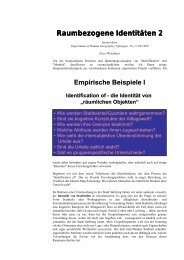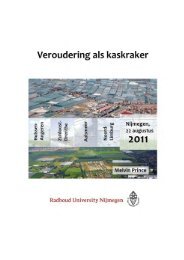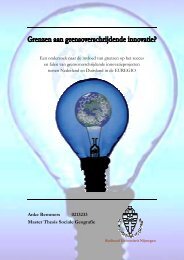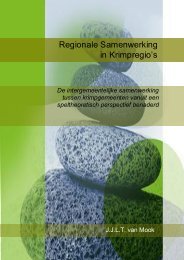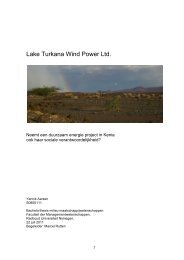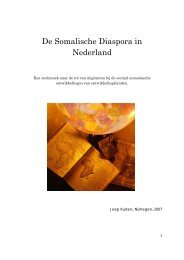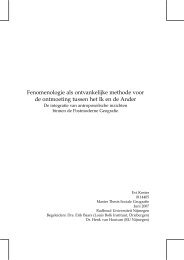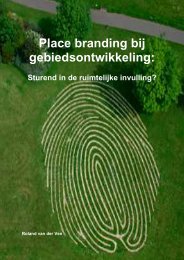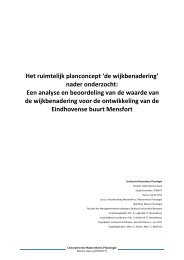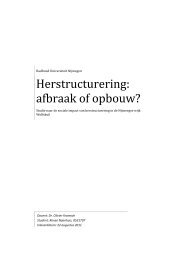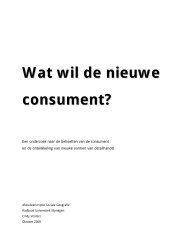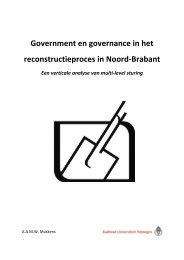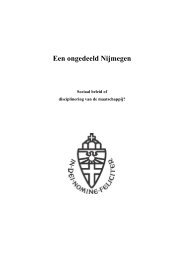Trading with the enemy in Mitrovica, Kosovo. - RUhosting
Trading with the enemy in Mitrovica, Kosovo. - RUhosting
Trading with the enemy in Mitrovica, Kosovo. - RUhosting
You also want an ePaper? Increase the reach of your titles
YUMPU automatically turns print PDFs into web optimized ePapers that Google loves.
“Everyth<strong>in</strong>g that happens <strong>in</strong> <strong>Mitrovica</strong> is politicised,” one analyst noted. “This is not a human<br />
conflict; it is a political conflict. It is not based on hatred,” said ano<strong>the</strong>r official. (CARE, 2006)<br />
This political conflict is not over. Although Alb<strong>in</strong> Kurti's claim that <strong>the</strong> conflict could only be solved when<br />
<strong>Kosovo</strong> would become <strong>in</strong>dependent because only <strong>the</strong>n Serbs would stop fight<strong>in</strong>g for <strong>Kosovo</strong> 17 may have<br />
seemed logical, this did not turn out to be a reality. Serbs have not given up and <strong>the</strong> conflict goes on every<br />
day. Every week <strong>the</strong> newspapers are filled <strong>with</strong> clashes between Prist<strong>in</strong>a and Belgrade 18<br />
. In a climate of<br />
cont<strong>in</strong>u<strong>in</strong>g (mostly non-violent) conflict like this it may be impossible to reconcile. People don't “forgive”<br />
someone when <strong>the</strong> fight is not over yet. In short, politics still have a major <strong>in</strong>fluence on <strong>in</strong>ter-ethnic relations<br />
<strong>in</strong> <strong>Kosovo</strong> that cannot be ignored. Therefore this factor and its effect on <strong>in</strong>ter-ethnic relations and trade will<br />
be discussed <strong>in</strong> this paragraph.<br />
5.4.1. Political change & <strong>the</strong> Albanian approach to multi-ethnicity<br />
There is a difference between Albanian and Serbian politics regard<strong>in</strong>g its <strong>in</strong>fluence on <strong>in</strong>ter-ethnic relations.<br />
The current Albanian political approach has a more positive effect on <strong>in</strong>ter-ethnic relations than <strong>the</strong> Serbian<br />
approach and this is <strong>in</strong> l<strong>in</strong>e <strong>with</strong> <strong>the</strong>ir respective political goals. As has been discussed, <strong>in</strong> <strong>the</strong> years after <strong>the</strong><br />
conflict ended Albanians had revenge on <strong>the</strong>ir m<strong>in</strong>ds caus<strong>in</strong>g much <strong>in</strong>ter-ethnic violence. In 2002/2003 <strong>the</strong><br />
Albanian political approach changed, and <strong>with</strong> this <strong>the</strong> situation on <strong>the</strong> ground as well. “The new (Albanian)<br />
approach was to be multi-ethnic. Serbs have <strong>the</strong> opposite approach” (respondent #1). This is <strong>in</strong> l<strong>in</strong>e <strong>with</strong> <strong>the</strong><br />
'standards before status' policy. Which basically states that <strong>Kosovo</strong> should reach certa<strong>in</strong> standards of good<br />
governance before <strong>Kosovo</strong>'s status would be discussed 19<br />
. This worked as a huge motivator for Albanians to<br />
work on <strong>the</strong>ir relations <strong>with</strong> Serbs. Sadly, because it is such a clear external motivator it rema<strong>in</strong>s a question<br />
to which extend this more open attitude to Serbs and <strong>in</strong>tegration is <strong>in</strong>ternalised <strong>in</strong> <strong>the</strong> Albanian society.<br />
Respondent #1 summarised <strong>the</strong> attitude of most Albanians regard<strong>in</strong>g Serbs <strong>in</strong> <strong>the</strong>se words: “(I) don't like<br />
<strong>the</strong>m but I have to be friends (<strong>with</strong> <strong>the</strong>m) because that's how it works”. Politics <strong>in</strong>fluence everyth<strong>in</strong>g he says,<br />
although differently for Serbs than for Albanians. “Serbs need to be anti-Albanian, Albanians don’t need to<br />
be anti-Serb”. An Albanian director of an NGO <strong>in</strong> Prist<strong>in</strong>a stated he wants Serbs to <strong>in</strong>tegrate <strong>in</strong> <strong>Kosovo</strong><br />
society but when repeatedly asked why this <strong>in</strong>tegration would be important he could come up <strong>with</strong> only one<br />
answer: “it is a goal of <strong>the</strong> government and a goal of <strong>the</strong> <strong>in</strong>ternational community” (respondent #8). No<br />
o<strong>the</strong>r reasons were given by him.<br />
17 VETEVENDOSJE! Movement's Manifesto. visited on 21-05-2009. http://vetevendosje.org/<br />
18 Even small th<strong>in</strong>gs become huge this way. An example is <strong>the</strong> Serbian president visit<strong>in</strong>g <strong>Kosovo</strong>. This was not a big<br />
deal <strong>in</strong> itself, <strong>the</strong> turmoil was about whe<strong>the</strong>r or not he asked permission. K-Albanians believe he should have asked<br />
permission to enter “<strong>the</strong>ir” territory. Serbs believe he should not have to ask permission because it is “<strong>the</strong>ir” territory.<br />
B92. visited on 20-05-2009<br />
http://www.b92.net/eng/news/politics-article.php?yyyy=2009&mm=04&dd=17&nav_id=58569,<br />
19 UNMIK - What are <strong>the</strong> standards? Visited on 10-11-2009.<br />
http://www.unmikonl<strong>in</strong>e.org/standards/ Visited on 10-11-2009<br />
60



